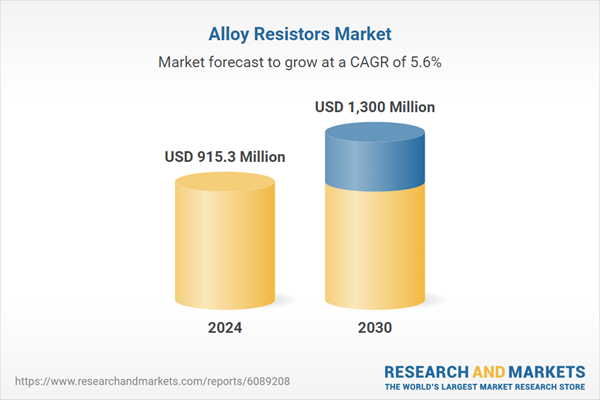Global Alloy Resistors Market - Key Trends & Drivers Summarized
Why Are Alloy Resistors Integral to Precision Circuit Design, Power Management, and Thermal Stability Across Industries?
Alloy resistors - typically manufactured from specialized resistive alloys such as nickel-chromium (NiCr), manganin, constantan, and copper-manganese - are engineered to provide highly stable, low-temperature-coefficient resistance for use in precision and power-sensitive electronic applications. These resistors exhibit superior reliability, long-term stability, and low parasitic inductance, making them indispensable in current sensing, voltage regulation, and temperature compensation circuits.Used extensively in automotive electronics, industrial controls, power supplies, instrumentation, and consumer devices, alloy resistors offer consistent resistance values under varying load and environmental conditions. Their role is increasingly critical as electronic systems become more compact, power-dense, and performance-sensitive - requiring passive components that maintain functional integrity in demanding use cases.
How Are Material Advancements and Manufacturing Precision Enhancing the Performance of Alloy Resistors?
Modern alloy resistors benefit from precise alloy composition control, laser trimming, and low-noise film deposition techniques that enhance tolerance levels, heat dissipation, and electrical consistency. Advanced metallurgical formulations and precision winding or foil etching methods are enabling resistors with temperature coefficients as low as ±5 ppm/°C and tolerance ratings down to ±0.01%.Surface mount (SMD) and through-hole configurations are being tailored for both high-current and low-profile applications, with encapsulation technologies improving resistance to humidity, vibration, and thermal cycling. These advances are supporting resistor performance in mission-critical environments such as aerospace avionics, medical devices, and high-efficiency power conversion systems.
Which Application Segments and End-Use Markets Are Driving Demand for Alloy Resistors?
The automotive sector is a key growth engine for alloy resistors, especially in EV powertrains, battery management systems (BMS), ADAS modules, and precision motor controls, where current sensing accuracy is vital. Industrial automation systems, renewable energy converters, and telecom infrastructure also utilize these resistors in power distribution, feedback loops, and overload protection circuits.Consumer electronics, particularly high-end audio systems and computing devices, rely on alloy resistors for precision voltage regulation and signal conditioning. In the medical field, diagnostic equipment and implantable devices require ultra-reliable, low-noise resistors made from biocompatible alloys. Geographically, Asia-Pacific dominates manufacturing and consumption, led by electronics production hubs in China, Japan, South Korea, and Taiwan. North America and Europe drive demand for high-spec, automotive-grade and aerospace-certified resistors.
How Are Standards, Miniaturization, and Energy Efficiency Trends Reshaping Market Requirements?
Tighter industry standards for tolerance, TCR (temperature coefficient of resistance), and RoHS/REACH compliance are prompting suppliers to deliver resistors with tighter process control and superior traceability. Miniaturization in PCB design is driving demand for resistors with higher power density, lower parasitics, and ultra-compact form factors without compromising thermal performance.Energy-efficient electronics are increasingly reliant on alloy resistors for precise current monitoring, enabling intelligent power management and load balancing. As IoT, 5G, and edge computing architectures proliferate, designers require resistors that operate reliably in temperature-variable and electromagnetically noisy environments. This is pushing innovation in alloy blends, packaging, and automated testing for extended lifecycle validation.
What Are the Factors Driving Growth in the Alloy Resistors Market?
The alloy resistors market is growing steadily due to rising demand for precision, thermal stability, and long-term reliability in modern electronic systems. Key drivers include the electrification of transportation, growth in power electronics, advances in industrial automation, and the expanding scope of miniaturized connected devices. As circuits become increasingly sophisticated and failure-intolerant, alloy resistors are gaining prominence as performance-critical components in high-reliability applications.Looking ahead, the market's trajectory will depend on how effectively manufacturers align material innovation, manufacturing precision, and customization flexibility with evolving electronic design needs. As global systems demand smarter, safer, and more efficient control architectures, could alloy resistors become the hidden cornerstone of next-generation electronic reliability and power intelligence?
Report Scope
The report analyzes the Alloy Resistors market, presented in terms of market value (US$). The analysis covers the key segments and geographic regions outlined below:- Segments: Type (2512 Alloy Resistors, 0603 Alloy Resistors, 0805 Alloy Resistors, 1206 Alloy Resistors, 2010 Alloy Resistors, Other Types); Application (Mobile Phones, Batteries, Power Devices, Inverters / Converters, Other Applications).
- Geographic Regions/Countries: World; United States; Canada; Japan; China; Europe (France; Germany; Italy; United Kingdom; Spain; Russia; and Rest of Europe); Asia-Pacific (Australia; India; South Korea; and Rest of Asia-Pacific); Latin America (Argentina; Brazil; Mexico; and Rest of Latin America); Middle East (Iran; Israel; Saudi Arabia; United Arab Emirates; and Rest of Middle East); and Africa.
Key Insights:
- Market Growth: Understand the significant growth trajectory of the 2512 Alloy Resistors segment, which is expected to reach US$378.2 Million by 2030 with a CAGR of a 7%. The 0603 Alloy Resistors segment is also set to grow at 4% CAGR over the analysis period.
- Regional Analysis: Gain insights into the U.S. market, valued at $249.4 Million in 2024, and China, forecasted to grow at an impressive 9% CAGR to reach $258.5 Million by 2030. Discover growth trends in other key regions, including Japan, Canada, Germany, and the Asia-Pacific.
Why You Should Buy This Report:
- Detailed Market Analysis: Access a thorough analysis of the Global Alloy Resistors Market, covering all major geographic regions and market segments.
- Competitive Insights: Get an overview of the competitive landscape, including the market presence of major players across different geographies.
- Future Trends and Drivers: Understand the key trends and drivers shaping the future of the Global Alloy Resistors Market.
- Actionable Insights: Benefit from actionable insights that can help you identify new revenue opportunities and make strategic business decisions.
Key Questions Answered:
- How is the Global Alloy Resistors Market expected to evolve by 2030?
- What are the main drivers and restraints affecting the market?
- Which market segments will grow the most over the forecast period?
- How will market shares for different regions and segments change by 2030?
- Who are the leading players in the market, and what are their prospects?
Report Features:
- Comprehensive Market Data: Independent analysis of annual sales and market forecasts in US$ Million from 2024 to 2030.
- In-Depth Regional Analysis: Detailed insights into key markets, including the U.S., China, Japan, Canada, Europe, Asia-Pacific, Latin America, Middle East, and Africa.
- Company Profiles: Coverage of players such as ABB Ltd., Amazon Web Services, Inc., American Tower Corporation, Arista Networks, Inc., Bentley Systems, Incorporated and more.
- Complimentary Updates: Receive free report updates for one year to keep you informed of the latest market developments.
Some of the 32 companies featured in this Alloy Resistors market report include:
- Allegheny Technologies Incorporated (ATI)
- Aperam
- Bourns, Inc.
- Caddock Electronics, Inc.
- Chongqing Chuanyi Co., Ltd.
- Danotherm Electric A/S
- Ever Ohms Technology Co., Ltd.
- Guangdong Fenghua Advanced Tech Co., Ltd.
- H.C. Starck Solutions
- Isabellenhütte Heusler GmbH & Co. KG
- Kanthal (Part of Sandvik Group)
- KOA Speer Electronics, Inc.
- LIZ Electronics Co., Ltd.
- Metallux AG
- Murata Manufacturing Co., Ltd.
- Ohmite Manufacturing Company
- Panasonic Corporation
- Ralec Electronic Corporation
- Riedon Inc.
- ROHM Co., Ltd.
This edition integrates the latest global trade and economic shifts into comprehensive market analysis. Key updates include:
- Tariff and Trade Impact: Insights into global tariff negotiations across 180+ countries, with analysis of supply chain turbulence, sourcing disruptions, and geographic realignment. Special focus on 2025 as a pivotal year for trade tensions, including updated perspectives on the Trump-era tariffs.
- Adjusted Forecasts and Analytics: Revised global and regional market forecasts through 2030, incorporating tariff effects, economic uncertainty, and structural changes in globalization. Includes historical analysis from 2015 to 2023.
- Strategic Market Dynamics: Evaluation of revised market prospects, regional outlooks, and key economic indicators such as population and urbanization trends.
- Innovation & Technology Trends: Latest developments in product and process innovation, emerging technologies, and key industry drivers shaping the competitive landscape.
- Competitive Intelligence: Updated global market share estimates for 2025, competitive positioning of major players (Strong/Active/Niche/Trivial), and refined focus on leading global brands and core players.
- Expert Insight & Commentary: Strategic analysis from economists, trade experts, and domain specialists to contextualize market shifts and identify emerging opportunities.
Table of Contents
Companies Mentioned (Partial List)
A selection of companies mentioned in this report includes, but is not limited to:
- Allegheny Technologies Incorporated (ATI)
- Aperam
- Bourns, Inc.
- Caddock Electronics, Inc.
- Chongqing Chuanyi Co., Ltd.
- Danotherm Electric A/S
- Ever Ohms Technology Co., Ltd.
- Guangdong Fenghua Advanced Tech Co., Ltd.
- H.C. Starck Solutions
- Isabellenhütte Heusler GmbH & Co. KG
- Kanthal (Part of Sandvik Group)
- KOA Speer Electronics, Inc.
- LIZ Electronics Co., Ltd.
- Metallux AG
- Murata Manufacturing Co., Ltd.
- Ohmite Manufacturing Company
- Panasonic Corporation
- Ralec Electronic Corporation
- Riedon Inc.
- ROHM Co., Ltd.
Table Information
| Report Attribute | Details |
|---|---|
| No. of Pages | 284 |
| Published | February 2026 |
| Forecast Period | 2024 - 2030 |
| Estimated Market Value ( USD | $ 915.3 Million |
| Forecasted Market Value ( USD | $ 1300 Million |
| Compound Annual Growth Rate | 5.6% |
| Regions Covered | Global |









